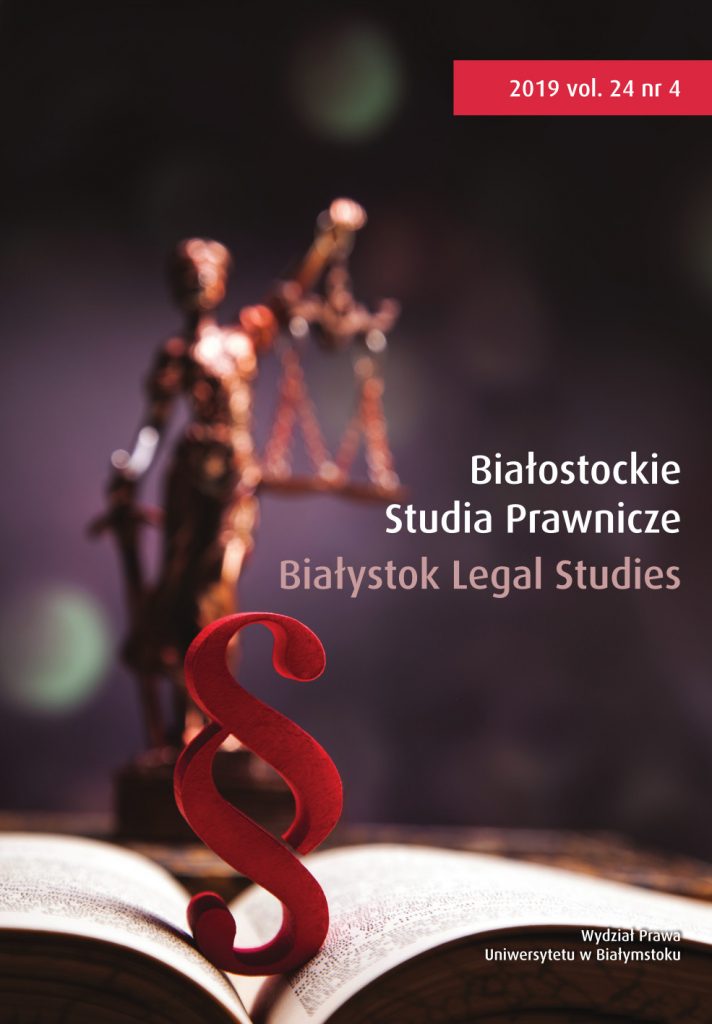Konsekwencje uchwalenia the Fixed-term Parliaments Act 2011 dla brytyjskiej konstytucyjnej praktyki parlamentarnej
Abstrakt
The Fixed-term Parliaments Act 2011 received royal assent on September 15, 2011 and entered into force on that day. The assumption of the project promoters, was that passing this act would result in the repeal of the prerogative of the monarch who, on the prime minister’s advice, could at any time dissolve parliament and initiate parliamentary elections before expiry of the term for which electoral powers were granted to its members. However, on April 18, 2017, the then prime minister announced that she planned to call a snap election on June 8, 2017. The order for the general election announcement on June 8, 2017 was issued on April 25, 2017. As a result, parliament was dissolved on May 3, 2017. Considering the above, one can’t but agree with the thesis that the adoption of this law is an example of unnecessary and defective legislation, and that it is also an ineffective act insofar that while the legislative goal was to reduce the frequency of general elections and limit the instrumental influence of the prime minister on the date of dissolution of the parliament, this has not been achieved. This conclusion, along with recently observed systemic reforms and changes in the constitutional practice of the United Kingdom, also allows to say that progressing jurisdiction of the system does not always lead to the achievement of the assumed goals and changes in constitutional practice.Bibliografia
Barnett H., Constitutional and administrative law, Londyn 2009.
Bogdanor V., The Monarchy and the Constitution, Oxford 1997.
Constitutional statutes, „Statute Law Review” 2007, nr 28(2), http://slr.oxfordjournals.org.
Gay O., White I., Fixed-term Parliaments, SN/PC/831, www.parliament.uk.
Hazell R., The Constitution Unit, University College London, Fixed Term Parliaments, August 2010, https://www.ucl.ac.uk/constitution-unit/sites/constitution-unit/files/150.pdf.
Hook M., Gay O., Dissolution of Parliament, Notes on Parliament and Constitution, SN/PC/05085, www.parliament.uk.
House of Commons Library Briefing, Confidence motions, 16 stycznia 2019 r., https://researchbriefings.parliament.uk/ResearchBriefing/Summary/SN02873.
House of Lords Select Committee on the Constitution, Call for Evidence: Fixed-Term Parliaments, 15 lipca 2010 r., www.parliament.uk.
https://www.instituteforgovernment.org.uk/blog/101-uses-zombie-parliament.
Projekt ustawy nr 63 w sesji 2010-2011, www.parliament.uk.
Rządowe objaśnienia do projektu ustawy, The Fixed-term Parliaments Bill, Explanatory Notes, www.parliament.uk.
Kelly R., Powell T., Confidence motions, SN/PC/2873, 9 lipca 2010 r., www.parliament.uk.
Kelly R., Fixed-term Parliaments Act 2011, Commons Library Briefing Paper Number 06111, 27 April 2017, www.parliament.uk.
Kelly R., The election of a Speaker, SN/PC/05074, 11 marca 2010 r., www.parliament.uk.
Kelly R., Wash-up, Notes on Parliament and Constitution, SN/PC/05398, 11 marca 2010, www.parliament.uk.
Michalak A., Postępowanie ustawodawcze w parlamencie Zjednoczonego Królestwa w zakresie rządowych projektów ustaw publicznych, Warszawa 2013.
Michalak A., Projekty reformy sposobu głosowania w wyborach do Izby Gmin i kadencji parlamentu, „Studia Wyborcze”, t. 10, 2010.
Norton P., The Fixed-term Parliaments Act and Votes of Confidence, “Parliamentary Affairs” 2016, vol. 69.
Public Administration and Constitutional Affairs Committee report, The Role of Parliament in the UK Constitution, Interim Report the Status and Effect of Confidence Motions and the Fixedterm Parliaments Act 2011, https://publications.parliament.uk/pa/cm201719/cmselect/cmpubadm/1813/1813.pdf.
Public Administration and Constitutional Affairs Committee report, The Role of Parliament in the UK Constitution, Interim Report the Status and Effect of Confidence Motions and the Fixedterm Parliaments Act 2011, https://publications.parliament.uk/pa/cm201719/cmselect/cmpubadm/1813/1813.pdf.
Pułło A., Ustroje państw współczesnych, Warszawa 2007.
Rogers R., Walters R., Walters R. H., How Parliament works, Edynburg 2006.
Urbaniak K., Prawo wyborcze do parlamentu Zjednoczonego Królestwa Wielkiej Brytanii i Irlandii Północnej, (w:) S. Grabowska, K. Składowski (red.), Prawo wyborcze do Parlamentu w wybranych państwach europejskich, Zakamycze 2006.
White I., Kelly R., Coleman Ch., General election timetable, Notes on Parliament and Constitution, SN/PC/4454, 17 marca 2010, www.parliament.uk.
Wieciech T., Wpływ ustawy o kadencji parlamentu (Fixed-term Parliaments Act, 2011) na brytyjski system rządów, (w:) A. Zięba (red.), Konstytucjonalizm w państwach anglosaskich, Kraków 2013.



